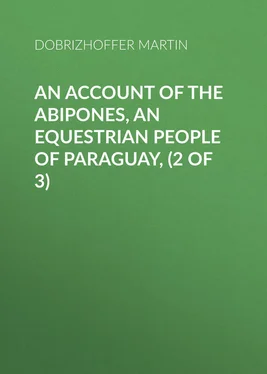Martin Dobrizhoffer - An Account of the Abipones, an Equestrian People of Paraguay, (2 of 3)
Здесь есть возможность читать онлайн «Martin Dobrizhoffer - An Account of the Abipones, an Equestrian People of Paraguay, (2 of 3)» — ознакомительный отрывок электронной книги совершенно бесплатно, а после прочтения отрывка купить полную версию. В некоторых случаях можно слушать аудио, скачать через торрент в формате fb2 и присутствует краткое содержание. Жанр: foreign_antique, foreign_prose, на английском языке. Описание произведения, (предисловие) а так же отзывы посетителей доступны на портале библиотеки ЛибКат.
- Название:An Account of the Abipones, an Equestrian People of Paraguay, (2 of 3)
- Автор:
- Жанр:
- Год:неизвестен
- ISBN:нет данных
- Рейтинг книги:3 / 5. Голосов: 1
-
Избранное:Добавить в избранное
- Отзывы:
-
Ваша оценка:
- 60
- 1
- 2
- 3
- 4
- 5
An Account of the Abipones, an Equestrian People of Paraguay, (2 of 3): краткое содержание, описание и аннотация
Предлагаем к чтению аннотацию, описание, краткое содержание или предисловие (зависит от того, что написал сам автор книги «An Account of the Abipones, an Equestrian People of Paraguay, (2 of 3)»). Если вы не нашли необходимую информацию о книге — напишите в комментариях, мы постараемся отыскать её.
An Account of the Abipones, an Equestrian People of Paraguay, (2 of 3) — читать онлайн ознакомительный отрывок
Ниже представлен текст книги, разбитый по страницам. Система сохранения места последней прочитанной страницы, позволяет с удобством читать онлайн бесплатно книгу «An Account of the Abipones, an Equestrian People of Paraguay, (2 of 3)», без необходимости каждый раз заново искать на чём Вы остановились. Поставьте закладку, и сможете в любой момент перейти на страницу, на которой закончили чтение.
Интервал:
Закладка:
Why they believe the Pleiades to be the representation of their grandfather, remains to be discussed. On this subject also I can advance nothing but conjecture, nor can any thing certain be derived either from the Abipones or from the historians of America. The seven daughters of Lycurgus were placed by Jove amongst the stars, because they educated Bacchus in the island of Naxos, and distinguished by the name of Pleiades, as poets feign. What if we say that the Abipones, who are so fond of drinking-parties, worshipped those stars, because they were the nurses of Bacchus? But this pleasant idea would suit conversation better than history. It deserves attention, that, though various nations have paid divine honours to the sun, moon, and other stars, we cannot find a syllable respecting the worship of the Pleiades in any part of holy writ; unless, indeed, you say that they were adored by those nations mentioned in the 17th Chap. and the 3d verse of Deuteronomy: "That they go and serve other Gods, and worship them, the sun and moon, and all the host of heaven." For, as St. Jerome observes, the "whole host of heaven" means all the stars, including, of course, the Pleiades amongst the rest.
After long and frequent consideration of these things, it appears most probable to my mind, that the savages of Paraguay derived the knowledge and worship of the Pleiades from the ancient Peruvians; who, although they venerated God the creator and preserver of all things, (under the name of Pachacàmac,) are nevertheless said to have adored the sea, rocks, trees, and, what is of most importance to the present subject, the Pleiades, whom they called Colcà. The Inca Manco Capac, their ruler and chief lawgiver, afterwards substituted new superstitions for old ones. He decreed, that divine honours should be paid to the sun. To it alone divine veneration and sacrifices were paid, though the moon also, which they call the consort of the sun, and certain stars, which they call the handmaids of the moon, were honoured with silver altars and adoration to a certain extent, but inferior to that paid a divinity. Amongst the stars they thought the Pleiades worthy of a distinguished place, and chief honour, either from the wonderful manner in which they are placed, or from their singular brightness. After the Spaniards obtained dominion over Peru by force of arms, it is credible that the Peruvians, to avoid this dreadful slavery, stole away wherever they could, and that many of them migrated into the neighbouring Tucuman, and thence, for the sake of security, into the deserts of Chaco, close by; where, amongst other superstitions they may have taught the inhabitants a religious observance of the Pleiades. But since the Abipones, you will object, cannot even express the name of God in their native tongue, and respectfully address the evil spirit by the title of their grandfather, why did they not learn from the Peruvians the name and worship of God, with a hatred and contempt for the evil spirit? The latter certainly entertained such a reverence for the God Pachacàmac, that they thought it a part of their religion not to utter his name except on very important occasions, and whenever they did, to accompany the mention of it with great marks of reverence. On the other hand, they held the devil, whom they called Cupay, in much contempt. Why did not the Peruvians impart that reverence for God, and contempt for the evil spirit to the Abipones, at the same time that they instructed them in a religious observance of the Pleiades? Because vice is more easily learnt than virtue, as healthy persons are sooner infected by the sick, than sick ones cured by the healthy. Yet, if you persist in denying that the knowledge of the Pleiades was brought from Peru, I will oppose you no longer; but what hinders us from believing that it crept into Paraguay from the neighbouring Brazil, where the Tapuyas, formerly a fierce and numerous nation, greatly venerated the rise of the Pleiades, and worshipped those stars as divinities with singing and dancing. As no memorials are at hand from which any thing determinate can be elicited on this subject, I have thought fit to adduce all these conjectures, opinions, and probabilities which may seem in any way to relate to the evil spirit, the infamous grandfather of the Abipones, and to the Pleiades the representation of him.
CHAPTER XI.
OF THE DIVISION OF THE ABIPONIAN NATION, OF THEIR PAUCITY, AND OF THE CHIEF CAUSES THEREOF
To look for policy in savages will appear to you like seeking a knot in a bulrush, or expecting water from a flint. The Abipones, a nation obstinately attached to their ancient liberty, lived at their own pleasure, impatient of all controul. Their own will was their sole law. Nevertheless, as bees, ants, and every kind of animal, by natural instinct, observe certain peculiarities of their species, in like manner the most ferocious Indians pertinaciously retain, even to this day, certain customs, the ordinances of their nation, handed down to them by their ancestors, and regarded by them as laws. I shall proceed to treat of the political, economical, and military regulations of the Abipones, of their customs and magistrates.
The whole nation of the Abipones is divided into three classes: the Riikahès, who inhabit extensive plains; the Nakaigetergehes, who love the lurking-holes of the woods; and lastly, the Yaaucanigas, who were formerly a distinct nation, and used a separate language. In the last century, the Spaniards, whom they had gone out to slaughter, surprized them by the way, and almost destroyed them all. A few who survived the massacre, with the widows and children of the slain, joined the neighbouring Abipones, and both nations, by inter-marriages, coalesced into one; the old language of the Yaaucanigas falling into disuse. The Abiponian tribes pursue the same manner of life, and their customs and language, with the exception of a few words, are alike. Wondrous unanimity, and a constant alliance in arms, reigned amongst them as long as they had to deal with the Spaniards, against whom, as against a mutual foe, they bear an innate hatred, and whose servitude they resist with united strength. But though bound by the ties of consanguinity and friendship, impatient of the smallest injury, they eagerly seize on any occasion of war, and frequently weaken each other with mutual slaughter.
Like the other American savages, some of the Abipones practise polygamy and divorce. Yet they are by no means numerous; the whole nation consisting of no more than five thousand people. Intestine skirmishes, excursions against the enemy, the deadly contagion of the measles and small-pox, and the cruelty of the mothers towards their offspring, have combined to render their number so small. Now learn the cause of this inhumanity in the women. The mothers suckle their children for three years, during which time they have no conjugal intercourse with their husbands, who, tired of this long delay, often marry another wife. The women, therefore, kill their unborn babes through fear of repudiation, sometimes getting rid of them by violent arts, without waiting for their birth. Afraid of being widows in the life-time of their husbands, they blush not to become more savage than tigresses. Mothers spare their female offspring more frequently than the males, because the sons, when grown up, are obliged to purchase a wife, whereas daughters, at an age to be married, may be sold to the bridegroom at almost any price.
From all this you may easily guess that the Abiponian nations abound more in women than in men, both because female infants are seldomer killed by their mothers, because the women never fall in battle as is the case with the men, and because women are naturally longer lived than men. Many writers make the mistake of attributing the present scanty population of America to the cruelty of the Spaniards, when they should rather accuse that of the infanticide mothers. We, who have grown old amongst the Abipones, should pronounce her a singularly good woman who brings up two or three sons. But the whole Abiponian nation contains so few such mothers, that their names might all be inscribed on a ring. I have known some who killed all the children they bore, no one either preventing or avenging these murders. Such is the impunity with which crimes are committed when they become common, as if custom could excuse their impiety. The mothers bewail their children, who die of a disease, with sincere tears; yet they dash their new-born babes against the ground, or destroy them in some other way, with calm countenances. Europeans will scarce believe that such affection for their dead children can co-exist with such cruelty towards them while they are alive, but to us it is certain and indubitable. After our instructions, however, had engrafted a reverence for the divine law in the minds of the Abipones, the barbarity of the mothers gradually disappeared, and husbands, with joyful eyes, beheld their hands no longer stained with the blood of their offspring, but their arms laden with those dear pledges. These are the fruits and the triumphs of religion, which fills not only Heaven but earth with inhabitants. When polygamy and divorce, the iniquitous murdering of infants, and the liberty of spontaneous abortion were at length, by means of Christian discipline, abolished, the nation of the Abipones, within a few years, rejoiced to see itself enriched with incredible accessions of both sexes.
Читать дальшеИнтервал:
Закладка:
Похожие книги на «An Account of the Abipones, an Equestrian People of Paraguay, (2 of 3)»
Представляем Вашему вниманию похожие книги на «An Account of the Abipones, an Equestrian People of Paraguay, (2 of 3)» списком для выбора. Мы отобрали схожую по названию и смыслу литературу в надежде предоставить читателям больше вариантов отыскать новые, интересные, ещё непрочитанные произведения.
Обсуждение, отзывы о книге «An Account of the Abipones, an Equestrian People of Paraguay, (2 of 3)» и просто собственные мнения читателей. Оставьте ваши комментарии, напишите, что Вы думаете о произведении, его смысле или главных героях. Укажите что конкретно понравилось, а что нет, и почему Вы так считаете.












